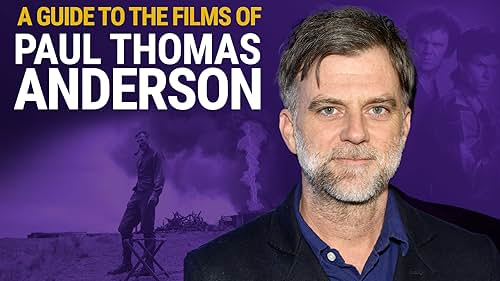Set in 1950s London, Reynolds Woodcock is a renowned dressmaker whose fastidious life is disrupted by a young, strong-willed woman, Alma, who becomes his muse and lover.Set in 1950s London, Reynolds Woodcock is a renowned dressmaker whose fastidious life is disrupted by a young, strong-willed woman, Alma, who becomes his muse and lover.Set in 1950s London, Reynolds Woodcock is a renowned dressmaker whose fastidious life is disrupted by a young, strong-willed woman, Alma, who becomes his muse and lover.
- Won 1 Oscar
- 55 wins & 121 nominations total
- Director
- Writer
- All cast & crew
- Production, box office & more at IMDbPro
Storyline
Did you know
- TriviaPaul Thomas Anderson got the initial idea for the film while he was sick in bed one day. His wife, Maya Rudolph, was tending to him and gave him a look that made him realize that she had not looked at him with such tenderness and love in a long time.
- GoofsA character says, "I don't mean to be racist..." That word didn't exist, at least in British English, in the 1950s. Someone might have used "racialist".
- Quotes
Reynolds Woodcock: Kiss me, my girl, before I'm sick.
- Crazy creditsThe typeface used for the credits is called Reynolds Stone and it was created by English wood engraver, typographer, and designer Reynolds Stone, who was a close friend of the parents of Daniel Day-Lewis.
- ConnectionsEdited into Funny or Die Presents...: Mugatu's Thread (2018)
- SoundtracksMy Foolish Heart
Written by Ned Washington and Victor Young
Performed by Oscar Peterson
Courtesy of The Verve Music Group
Under license from Universal Music Enterprises
Featured review
Tweet me @MarkoutTV if you have a comment about this review that you want me to see.
Most of the interest in this movie will stem from the reunion of Daniel Day-Lewis and Paul Thomas Anderson, star and director of There Will Be Blood, respectively. Moreover this allegedly will be the final performance of Daniel Day-Lewis' brilliant career. I say allegedly because similar rumors surrounded Lincoln, but given his famous selectivity regarding films, I am inclined to believe him and if this is truly his final performance, bravo on an unimpeachable career, sir (he won't read this).
This is a splendid film and one of the most captivating experiences I have had at a movie theater in quite some time. From scene one to the final, not a single person left the theater, not a single person talked or cracked a joke, and nobody took out their phone. An entire theater of people, singularly invested in what was on the screen. That is rare nowadays... even more rare when it comes to movies about dresses.
The credit for this phenomenon is all round. Let's start with the performers.
Although there are great supporting characters to be found here, particularly from Leslie Manville's performance as Reynold's stoic but well-mannered assistant, Cyril, this is a story about the relationship between two people: Reynolds Woodcock and Alma. Reynolds Woodcock is one of the mid-twentieth century's greatest dress-makers, his greatness brought about by his fiercely stringent routine and slavish devotion to his craft over any personal relationships. After a particularly stressful day he makes a solo sojourn to a diner where he meets Alma. There, they immediately take an interest in each other. Alma is a polite and self-conscious woman who immediately allows herself to become vulnerable in the confident-if-demanding arms of Reynolds.
I hesitate to call this film a "romance" or a "love story." I rather refer to the relationship between Reynolds and Alma as a great game: a game to see which one of them will get the other to make the necessary changes in order for their relationship to either become stronger, or fall apart. Reynolds is detached, possibly out of fear of falling in love or ruining his routine, possibly not. Alma's newfound sense of self-worth drives her to break down the rigid shell of Reynolds in order for him to prioritize her more. Again this may be because she is in love with him, or maybe she has never gotten close enough to another man to know how a relationship works, or maybe she secretly has the same need for power and control that Reynolds does, and not having it is maddening to her. All things are possibilities and there are infinite more.
I am using words like "possibly" a lot when describing the feelings and motivations of the characters here, and it's because this movie doesn't give you answers, and that's what makes it challenging, and therefore worth seeing. You will see these characters develop, you will see them argue, you will see them get along, you will see them exhibit coldness to one another, you will see them exhibit love and you will see them make some incredible decisions on their mutual-yet-connected journeys. However at no point will you be spoon-fed. Instead you will have to ask yourself: "what the hell are they thinking?" and be fine when you have to figure it out yourself. This film doesn't even answer the question of whether either of these people actually love one another. The most it does is show that to some extent, they learn to understand one another.
Daniel Day-Lewis is at his typical level of brilliance here. He perfectly plays the role of an obsessive personality, who is so averse to letting someone interfere with his work, yet who more and more, through both natural and artificial means, also doesn't want to lose the new woman in his life. It was a challenging role, with the need for confidence, intensity, comedic timing, physical and mental weakness at times, nonverbal communication and everything in between. If this ultimately becomes the framework for the definitive Daniel Day-Lewis performance, it will be earned.
However, I need to give a special shout-out to someone who was previously unknown to me, Vicky Krieps as Alma. She was given a difficult role to perform: she needed to have moments of vulnerability, confidence, sadness and glee. She needed to have both moments of submissiveness and vindictiveness and she had to make every second of her growth believable while acting alongside one of the most esteemed actors of all time. And she nailed it.
Only elevating the performances, Paul Thomas Anderson's direction is superb here. The film is lengthy, but not a single frame of 70mm film is wasted (and that's a good thing because that stuff is freaking expensive. Seriously those projectors are like tens of thousands of dollars each. The Alamo is one of the few theaters that has one and my ticket would've been like 23 bucks if it wasn't my birthday. Oh yeah, the movie).
Every moment of the film serves to advance the story. It's a slow burn, but you are always moving forward, and that is the important thing. The pace is consistently moving and therefore even though there are no time jumps or action scenes, it never gets boring. There is some damn stylish camera work here to boot, but it doesn't come off as pretentious. Pretentious is when M. Night Shyamalan says "Hey look what I can do" by trying to do a single-shot fight scene in The Last Airbender. When Paul Thomas Anderson does a single shot of Reynolds leaving his comfort zone while trying to find Alma (a woman who he still doesn't know how he truly feels about) at a crowded ball, you feel every level of his conflict. Everything from the beautiful imagery, to the spectacular camera work, to the authentic period representation, to the deliberate pacing and certainly to the career defining-performance of one lead, and the career-making performance of another, combine to make a delightful theater-going experience.
Oh and the ending is brilliant.
See it in 70mm if there is a theater near you with the capability.
Most of the interest in this movie will stem from the reunion of Daniel Day-Lewis and Paul Thomas Anderson, star and director of There Will Be Blood, respectively. Moreover this allegedly will be the final performance of Daniel Day-Lewis' brilliant career. I say allegedly because similar rumors surrounded Lincoln, but given his famous selectivity regarding films, I am inclined to believe him and if this is truly his final performance, bravo on an unimpeachable career, sir (he won't read this).
This is a splendid film and one of the most captivating experiences I have had at a movie theater in quite some time. From scene one to the final, not a single person left the theater, not a single person talked or cracked a joke, and nobody took out their phone. An entire theater of people, singularly invested in what was on the screen. That is rare nowadays... even more rare when it comes to movies about dresses.
The credit for this phenomenon is all round. Let's start with the performers.
Although there are great supporting characters to be found here, particularly from Leslie Manville's performance as Reynold's stoic but well-mannered assistant, Cyril, this is a story about the relationship between two people: Reynolds Woodcock and Alma. Reynolds Woodcock is one of the mid-twentieth century's greatest dress-makers, his greatness brought about by his fiercely stringent routine and slavish devotion to his craft over any personal relationships. After a particularly stressful day he makes a solo sojourn to a diner where he meets Alma. There, they immediately take an interest in each other. Alma is a polite and self-conscious woman who immediately allows herself to become vulnerable in the confident-if-demanding arms of Reynolds.
I hesitate to call this film a "romance" or a "love story." I rather refer to the relationship between Reynolds and Alma as a great game: a game to see which one of them will get the other to make the necessary changes in order for their relationship to either become stronger, or fall apart. Reynolds is detached, possibly out of fear of falling in love or ruining his routine, possibly not. Alma's newfound sense of self-worth drives her to break down the rigid shell of Reynolds in order for him to prioritize her more. Again this may be because she is in love with him, or maybe she has never gotten close enough to another man to know how a relationship works, or maybe she secretly has the same need for power and control that Reynolds does, and not having it is maddening to her. All things are possibilities and there are infinite more.
I am using words like "possibly" a lot when describing the feelings and motivations of the characters here, and it's because this movie doesn't give you answers, and that's what makes it challenging, and therefore worth seeing. You will see these characters develop, you will see them argue, you will see them get along, you will see them exhibit coldness to one another, you will see them exhibit love and you will see them make some incredible decisions on their mutual-yet-connected journeys. However at no point will you be spoon-fed. Instead you will have to ask yourself: "what the hell are they thinking?" and be fine when you have to figure it out yourself. This film doesn't even answer the question of whether either of these people actually love one another. The most it does is show that to some extent, they learn to understand one another.
Daniel Day-Lewis is at his typical level of brilliance here. He perfectly plays the role of an obsessive personality, who is so averse to letting someone interfere with his work, yet who more and more, through both natural and artificial means, also doesn't want to lose the new woman in his life. It was a challenging role, with the need for confidence, intensity, comedic timing, physical and mental weakness at times, nonverbal communication and everything in between. If this ultimately becomes the framework for the definitive Daniel Day-Lewis performance, it will be earned.
However, I need to give a special shout-out to someone who was previously unknown to me, Vicky Krieps as Alma. She was given a difficult role to perform: she needed to have moments of vulnerability, confidence, sadness and glee. She needed to have both moments of submissiveness and vindictiveness and she had to make every second of her growth believable while acting alongside one of the most esteemed actors of all time. And she nailed it.
Only elevating the performances, Paul Thomas Anderson's direction is superb here. The film is lengthy, but not a single frame of 70mm film is wasted (and that's a good thing because that stuff is freaking expensive. Seriously those projectors are like tens of thousands of dollars each. The Alamo is one of the few theaters that has one and my ticket would've been like 23 bucks if it wasn't my birthday. Oh yeah, the movie).
Every moment of the film serves to advance the story. It's a slow burn, but you are always moving forward, and that is the important thing. The pace is consistently moving and therefore even though there are no time jumps or action scenes, it never gets boring. There is some damn stylish camera work here to boot, but it doesn't come off as pretentious. Pretentious is when M. Night Shyamalan says "Hey look what I can do" by trying to do a single-shot fight scene in The Last Airbender. When Paul Thomas Anderson does a single shot of Reynolds leaving his comfort zone while trying to find Alma (a woman who he still doesn't know how he truly feels about) at a crowded ball, you feel every level of his conflict. Everything from the beautiful imagery, to the spectacular camera work, to the authentic period representation, to the deliberate pacing and certainly to the career defining-performance of one lead, and the career-making performance of another, combine to make a delightful theater-going experience.
Oh and the ending is brilliant.
See it in 70mm if there is a theater near you with the capability.
- How long is Phantom Thread?Powered by Alexa
Details
- Release date
- Countries of origin
- Official sites
- Languages
- Also known as
- El hilo fantasma
- Filming locations
- Victoria Hotel, Station Road, Robin Hood's Bay, Whitby, North Yorkshire, England, UK(where Reynolds meets Alma)
- Production companies
- See more company credits at IMDbPro
Box office
- Budget
- $35,000,000 (estimated)
- Gross US & Canada
- $21,198,205
- Opening weekend US & Canada
- $216,495
- Dec 31, 2017
- Gross worldwide
- $52,204,454
- Runtime2 hours 10 minutes
- Color
- Sound mix
- Aspect ratio
- 1.85 : 1
Contribute to this page
Suggest an edit or add missing content




















